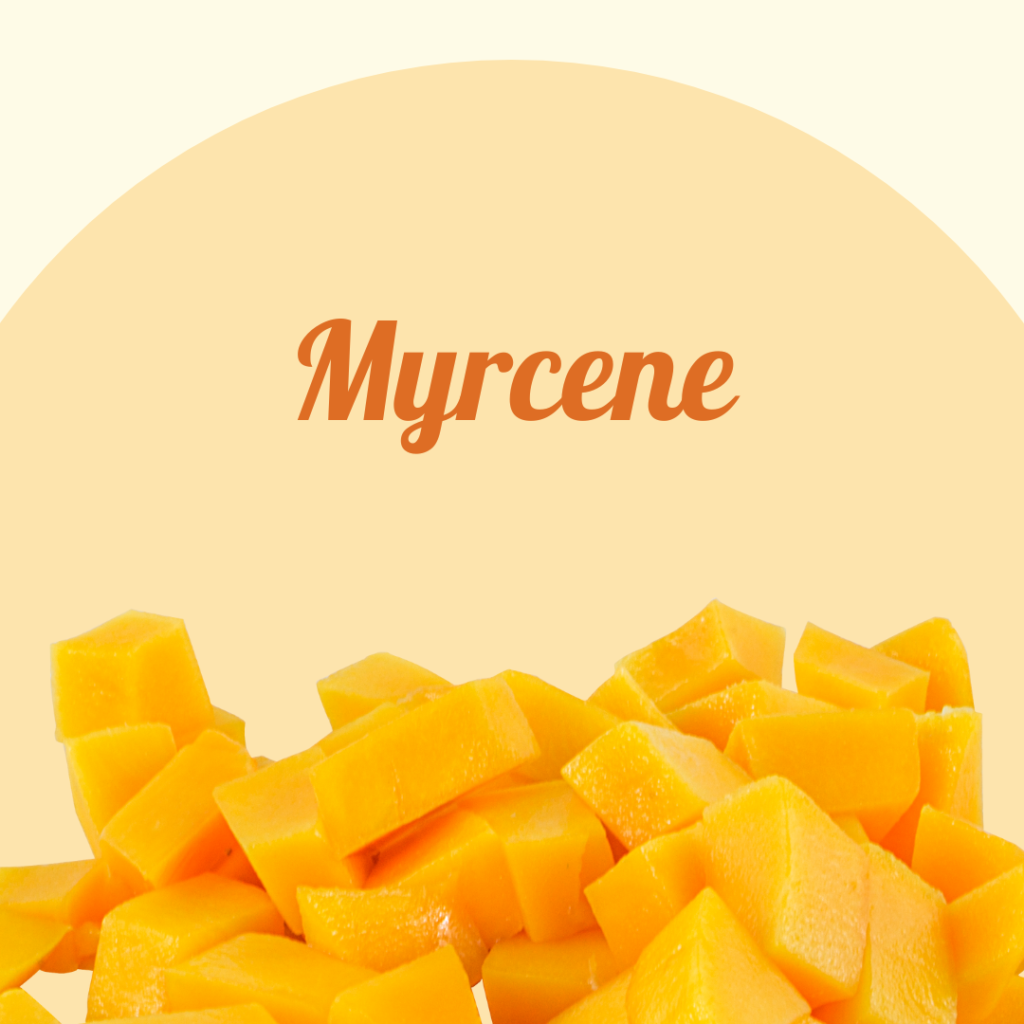“Cannabis strains higher in myrcene (>0.5%) are thought to have sedative qualities and strains lower in myrcene (<0.5%) are thought to have energizing qualities.”
The Basics
Myrcene is a terpene, an organic compound found in many plants, including cannabis, hops, and lemongrass. Terpenes are part of essential oils that help form the unique aromas of plants. In cannabis, Myrcene gives off spicy, earthy, and musky notes to varying degrees based on strains. Terpenes may also have a variety of health benefits.
Myrcene is one of the most abundant terpenes in cannabis, and it may play a role in the entourage effect. The entourage effect is the theory that the different compounds in cannabis work together to produce a synergistic effect. Myrcene may enhance the effects of other cannabinoids, such as THC and CBD.
Potential Health Benefits In Cannabis:
- Relaxation and sleep: Myrcene could have relaxing and sedative effects. It can treat anxiety and insomnia.*
- Pain relief: Myrcene has analgesic properties. It can treat pain, including headaches, muscle aches, and joint pain.*
- Inflammation: Myrcene has anti-inflammatory properties. It can help to reduce inflammation and swelling throughout the body.*
*The majority of studies were on mice/rats. Future research needs to be done on humans for conclusive results.
Myrcene and the entourage effect
Myrcene is thought to enhance the effects of other cannabinoids by increasing their permeability through the blood-brain barrier.1 This allows more cannabinoids to reach the brain, where they can exert their effects.
Myrcene and relaxation/sleep
Relaxation and sleep may be what myrcene is most known for, at least in the world of cannabis. When you’re looking for something to knock you out, the higher the myrcene the better.
Cannabis strains higher in myrcene (>0.5%) are thought to have sedative qualities and strains lower in myrcene (<0.5%) are thought to have energizing qualities.1 The high myrcene strains can create the couch-lock effect that many look for in an “indica-dominant” strain. This is mostly anecdotal evidence.
One study did use myrcene derived from cannabis on humans. The results showed that, 5 minutes after inhalation, the subjects were more relaxed, calm, and had an elevated mood.1 The same study measured brain activity as well. Unsurprisingly, the results showed that the brain activity of the subjects was similar to that of those who were actively meditating.
Myrcene and pain relief
Ask any medical marijuana patient and they’ll probably tell you they enjoy myrcene-rich strains for pain. Studies are trying to seek out why this is. One particular study published in 2021 in PubMed did just that.
Once again, this study involved rats and not humans. It was concluded that myrcene does interact with cannabinoid receptors in joints to have a pain-relieving effect for inflammatory joint disease.3 This was the first study to show that myrcene “may also act via cannabinoid receptors to reduce pain.”3 It is undetermined if some or all of the pain-relieving effects had to do with the interaction with cannabinoid receptors, or if the myrcene activated in the brain and ignored the pain.
While this is promising and helps to prove what medical patients have been suggesting for years, research on humans still needs to be done. Furthermore, this specific study not only used myrcene by itself but myrcene and CBD together. The presence of CBD did nothing to increase the myrcenes’ effects and disproved the entourage effect, at least between these two compounds.
Myrcene and inflammation
Myrcene also has anti-inflammatory properties, which can help to reduce pain and inflammation associated with chronic pain conditions such as arthritis. The same study used above for pain relief showed that myrcene had anti-inflammatory effects in inflammatory joint disease.3 It also revealed that oil from a Candeia Tree, native to Brazil and high in myrcene (10%), reduces swollen tissue.3
Another study published in 2020 about renal inflammation and oxidative stress in rats shows that myrcene reduces inflammation by inhibiting the production of pro-inflammatory cytokines.4 The results from this study suggest that myrcene could help with kidney inflammation and injury.
Myrcene’s antioxidant properties can help to protect cells from damage caused by inflammation. This was in the same study about oxidative stress. It proves that myrcene increases antioxidant molecules while decreasing MDA levels (a marker of oxidative stress).
Finding Myrcene-Dominant Strains
If you want to get your hands on myrcene-dominant strains, check out your local dispensary menu. Searching by terpenes isn’t an option on most menus, but many dispensaries will have terpene profiles linked to each product and specific available batch. It’s not uncommon to find strains with over 1% myrcene!
Some dispensaries may not provide any terpene profiles for their products. If that is the case, don’t be afraid to reach out over the phone or in-person to find what you are looking for. Budtenders are there to help. We understand some people may have communication disabilities. No worries. Try another dispensary’s online menu, if that is an option for you, to see if they provide the information you are looking for.
Smoking/Vaping Myrcene-Dominant Strains
Boiling Point – around 334℉/168℃
Strains high in myrcene can give off “a mildly sweet flavour profile.”1 If you want to experience these flavorful strains, it’s important to know how. Smoking/Combusting cannabis in direct heat (bowls, blunts, joints, etc.) can diminish the terpenes and flavor of cannabis. However, you will still get the desired effects but not as efficiently.
Vaping can help give you the best of both worlds. Taste and effects. Vaping allows you to control the temperature more precisely. Most vaporizer temp settings range from 300℉-450℉. It is important to know terpene boiling points as well as cannabinoid boiling points to get the most out of your medical or recreational experience. Too hot, and you will burn away flavor. Too cold and you may not get the desired effects. We recommend around 350℉-400℉.
Potential Health Benefits Outside of Cannabis:
- Antidiabetic: Myrcene could help lower abnormally high glucose levels in the blood.*
- Antioxidant: Myrcene could help to protect your cells against free radicals. Free radicals play a major role in heart disease, cancer, and other diseases.*
- Antibacterial: Myrcene could help prevent the growth/spread of bacteria.*
- Anticancer: Myrcene could be effective in fighting off certain types of cancer cells.*
Myrcene and cancer prevention
Billions of dollars go toward cancer research. Finding a cure is crucial to saving millions of lives, and myrcene could help. A study done in 2020 shows that it could have the ability to inhibit cancer growth by inducing apoptosis, or programmed cell death, in cancer cells.2
Another study, done outside of a living organism, showed myrcene suppressing breast cancer cell growth.1 Several other studies had a similar range of outcomes on MCF-7 breast carcinoma, HT-29 colon adenocarcinoma, P388 leukaemia cell, and other tumour cell lines.1 It’s too early to tell, but myrcene has shown to be promising in suppressing certain types of cancer cells. More research needs doing to see if the myrcene content in cannabis can produce a similar outcome from utilizing the plant.

Choose Myrcene for relaxation and pain relief
Myrcene is a terpene with a wide range of potential health benefits. It is known for its relaxing, soothing, and pain-relieving effects. Myrcene is also thought to have anti-inflammatory and anti-cancer properties. It can be consumed in a variety of ways, including smoking, vaping, and eating.
Head to your local dispensary to pick up some myrcene-rich products if you are experiencing any pain, inflammation, or anxiety. High myrcene doesn’t guarantee you these effects, but it has potential. You can also find myrcene in other plants, such as hops and lemongrass if you don’t use cannabis or can’t because it is illegal where you live.
It is important to note that more research is needed to confirm the health benefits of myrcene, especially in cannabis. However, the existing research suggests that myrcene is a promising compound with a variety of potential therapeutic applications. As new information comes out, we’ll be sure to have an update!
References:
- Myrcene—What Are the Potential Health Benefits of This Flavouring and Aroma Agent?: https://www.frontiersin.org/articles/10.3389/fnut.2021.699666
- Myrcene Exhibits Antitumor Activity Against Lung Cancer Cells by Inducing Oxidative Stress and Apoptosis Mechanisms: https://journals.sagepub.com/doi/full/10.1177/1934578X20961189#:~:text=Myrcene%20inhibited%20the%20proliferation%20of,reduction%20in%20mitochondrial%20membrane%20potential.
- Anti-Inflammatory and Analgesic Properties of the Cannabis Terpene Myrcene in Rat Adjuvant Monoarthritis: https://www.ncbi.nlm.nih.gov/pmc/articles/PMC9319952/#:~:text=The%20anti%2Dnociceptive%20effect%20of,involvement%20of%20the%20endocannabinoid%20system.
- Myrcene Attenuates Renal Inflammation and Oxidative Stress in the Adrenalectomized Rat Model: https://www.ncbi.nlm.nih.gov/pmc/articles/PMC7582976/#:~:text=Myrcene%20treatment%20resulted%20in%20downregulation,of%20kidney%20inflammation%20and%20injury.

